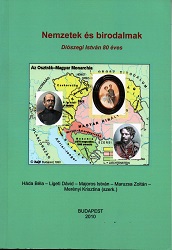
We kindly inform you that, as long as the subject affiliation of our 300.000+ articles is in progress, you might get unsufficient or no results on your third level or second level search. In this case, please broaden your search criteria.


Although, since 2001, the deep liquidity recession that followed the agrarian economy has been avoided and it appears that the wheels are in motion to ensure the constant renewal of farming processes, what is more, since joining the EU the proportion of total income in agriculture is growing, there are serious consequences to the fact that this income and the number of people living from agriculture barely makes up 40% of the income and population of the 1980s. The population of villages was seriously affected by the rationalization of the industry and the rapid growth of productivity: they were the first to become superfluous.
More...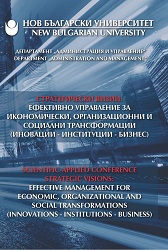
This paper analyzes the changes in the governance of agriculture cooperatives in Bulgaria. The researcher team put focus on external and internal mechanisms that influence organizational design of the cooperatives: market turbulence; destructive competition; participation of members in decision-making process; abuse of power resource by the Chairman; professionalizing of governance bodies; a change the goals. The team summarizes the empirical findings and claimed that the governance of Bulgarian agricultural cooperatives increasingly changing from the traditional cooperative model.
More...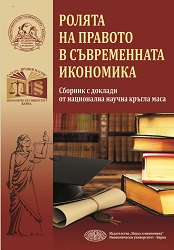
Agriculture in Bulgaria is a high-risk sector, but at the same time there are few tax incentives. Do the tax authorities during the tax inspections and audits manage to establish the actual outputs produced? Are the applied techniques from them effective and what results do they bring?
More...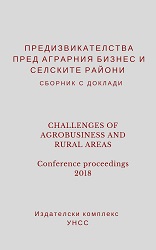
The purpose of this report is to review and evaluate the financial control mechanisms and systems of the Structural Funds in the agrarian sector for the programming period 2014-20210 and to put forward proposals to improve them. On the basis of comparative analysis for both periods are identified key areas and problems they have made the necessary recommendations and guidelines.
More...
Bulgaria is one of the most beautiful countries in Europe and in the world and the Rhodopes are one of the most beautiful mountains in Bulgaria. Our country has a wide variety of natural and anthropogenic factors that make it a preferred destination for many international and national tourists. The purpose of this report is to reveal the economic and social prerequisites for the development of rural, ecological, wine and culinary tourism in the Rhodope Mountains region and to analyze the degree of development of alternative forms of tourism in the analyzed area until today, until present moment.
More...
A brief overview of the activity of Todoroff Wine Cellar and its importance for the rural areas and the village of Brеstovitsa is made. Conclusions on the benefits to rural areas of the activity of a wine-making enterprise are revealed and some of the opportunities for their development in Bulgaria are revealed.
More...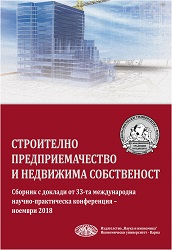
The aim of the report is to identify the opportunities for agritourism development in the context of the dynamics of the construction sector. People‘s growing concern about nature and energy scarcity leads to the need for a concept of „green“ or „sustainable“ building. The creation of „green buildings“ is a process of designing, building or operating buildings that guarantee people‘s well-being and create positive impacts on the climate and the natural environment. Agritourism meets specific tourism needs in accordance with the principles of sustainable development and nature conservation. Green houses built for agritourism are creating sustainable architecture in rural areas.
More...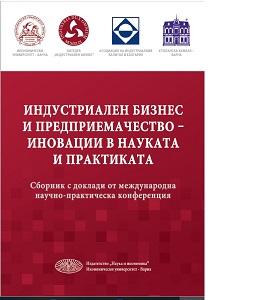
The aim of the present study based on definite criteria is to make an assessment of the territorial disposition of the manufacturers for production of vegetable oils by district towns and planning regions. On the basis of the assessment it is established that territorial disposition of manufacturers which produce vegetable oils is done as a result of the quest for closer of the structurally identified manufacturer up to basic raw materials which turns out beneficial influence on development on this subsector from the processing manufacture.
More...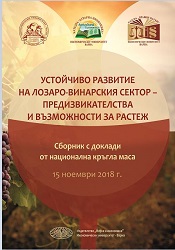
The following paper examines the negative impact of the change of legislative framework on the wine sector through a case study with a Bulgarian company that participated in the National Vineyard Re-conversion Program financed by the EU.
More...
Bulgaria is not only a country with long-standing traditions in the winegrowing and wine-producing aspects of the wine industry, but this is also a country with remarkable current and future prospects in the winemaking in Europe. As a proof to this statement we can present the fact that at the last 25th wine competition of Mondial du Bruxelles for 2018, Bulgaria, for the third time in a row, won the highest distinction - the Grand Gold Medal and in addition to that, it altogether won 44 medals, of which 15 gold medals and 28 silver medals. Thirty of the medals are awarded for red wine (68%), 10 for rosé and four for white wine (9%). The chief goal of this report is to prove that in the Northwest region, which is part of the North and the East wine-producing regions, there are favorable conditions which allow purposeful strategies to be applied in order to develop the wine-growing and the wine-producing industry in this area.
More...
Investments and the investment process in viticulture have characteristics that distinguish them from those in the other sectors due to the character of the plantations, the concentration of significant investment costs per unit area, the long period of return of the invested funds, the intertwining of biological processes with economic processes, the specifics of the technological decisions, the operation of specific agrarian policy, the combination of multiple interests due to the high degree of integration with wine production, etc. All these features imply a thorough and comprehensive study of the investment and investment process, the disclosure of their characteristics and the search for opportunities for rationalizing the organization, management and evaluation of the investment process in viticulture. An assessment of potential problems and difficulties in conducting investment preplanning research, investment planning decision and construction of vineyards is carried out. Analyzed and evaluated is the control of the investment process by investors and external institutions.
More...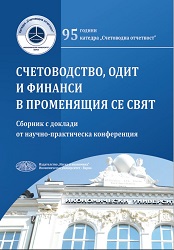
The aim of the report is to analyze the dynamics of bank lending in the agricultural sector in Bulgaria in the period 2007-2018 and to highlight the main trends and challenges in the process of providing financial resources for agricultural holdings. The impact of the credit on value creation in the sector is analyzed. An analysis of lending by commercial banks was carried out according to the amount of loans granted and by type and term. The significance of the credit for improving the production capacity of agricultural holdings is deduced.
More...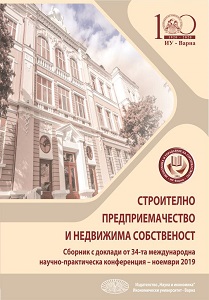
The current report presents the results from conducted comparative land market research in France and Bulgaria. It’s focused on analysis of the various factors by nature and importance, which have an effect, to one degree or another, on land prices, supply and demand of land. Some specific recommendations are presented about improving the functioning of the land market in today‘s conditions of sustained and continuous integration and globalization of world economy, complicated international relations and serious disturbances within the European Union. Specific measures are proposed with arguments about ensuring the efficient use of land resource in production processes on the territory of our country.
More...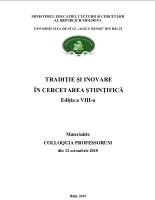
The Republic of Moldova has a rich natural and anthropogenic potential, but insufficient use of resources through agritourism is determined by poorly developed infrastructure (roads, water supply and sewage). The development of in the Republic of Moldova is supported by various activities, organized and carried out by various governmental and non-governmental structures and organizations.
More...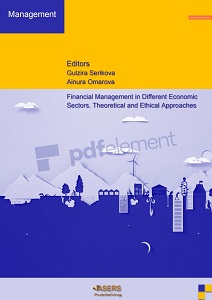
Agriculture has a special place in the country’s economy, as it produces food and responds for economic security of the country. The changes in the conditions of continuously transforming Kazakstan's market economy demand from the leaders of agricultural organizations to implement new, innovative ways and approaches to technologies and mechanisms of financial management in the strategy of agriculture. This chapter deals with the concept of financial management; it proves the importance of developing new forms and possible methods of financial management; it states the reasons for lack of effective financial management in the agricultural enterprises; it also identifies a number of factors that affect the financial flows within agricultural enterprises; it briefly reviews the current situation in Kazakh agriculture; it specifies the main areas that should be solved by a system of effective financial management that all in all will formulate the directions and recommendations for improving the financial management of agricultural enterprises of Kazakhstan and, accordingly, increase the competitive advantages of the industry. To improve the effectiveness of the financial management of agricultural enterprises of Kazakhstan in general, as well as in the investment sphere of their activity is necessary to carry out a number of measures, namely: use of specific methods of financial management in determining the results of financial and economic activity of enterprises of the sector agribusiness.
More...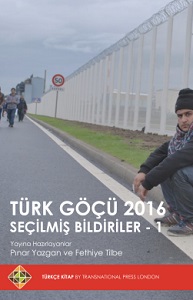
Bu çalışmanın konusu mevsimlik tarım işçisi kadınların göç ve çalışma deneyimleridir. Söz konusu kesim, Niğde iline ağırlıklı olarak Türkiye’nin Güneydoğu illerinden gelen kadınlar örneği üzerinden analiz edilmektedir. Çalışma üç yönlü bir amaca sahiptir: (1) göçün gerekçeleri ve göç sürecini açığa çıkarmak, (2) göçmen kadınların hane içi ve üretim alanında gerçekleşen emek sürecinin ikili doğasını ortaya koymak ve (3) göçmenlik sürecinde sosyal hayatın yeniden üretiminde hâkim olan mekanizmaları belirlemek. Çalışma Niğde ilinin Ovacık ve Konaklı kasabalarının kırsal alanlarında yürütülen derinlemesine mülakatlara dayanmaktadır. Mülakatlar 2014 yılının yaz ve bahar aylarında işçilerin geçici olarak barındığı çadırlarda, onların yaşam alanlarında yürütülmüştür. Bu makalenin ilk kısmında kadınları göçe iten gerekçeler ve göç sürecinin örgütlenmesi konuları üzerinde durulacaktır. İkinci olarak, kadınların işçileşme süreci ele alınacaktır. Son olarak ise, süreç boyunca kurulan sosyal ilişkiler incelenecektir. Araştırmanın sonuçları öncelikle kadınların işçileşmesinde temel etmenin maddi gerekçeler olduğunu ortaya koymaktadır. Ancak sürecin çarpıcı yönü işçileşmenin on yaşına dek inen çocuk yaştaki işçileri de kapsamasıdır. Öte yandan emek sürecinin örgütlenmesi ve sosyal ilişkilerin kurulmasında paternal otoritenin üç yönlü baskısı açığa çıkmaktadır. Bunların ilki göç sürecini örgütleyen aracılar ya da çavuşlardır. İkinci olarak geleneksel aile içi ilişkileri emek sürecine taşıyan erkekler ve son olarak kimi örneklerde görüldüğü üzere bu sürece hane içinde nezaret eden kaynanalardır.
More...
Bu çalışma tarım alanindaki üretim sürecinin geçici bileşenleri olan emek ve sermaye arasindaki ilişkinin nasıl kurulduğunu anlamayı amaçlamaktadır. Bu ilişkinin varsayıldığı gibi özgür emeğe ve rekabete dayalı rasyonel bir formda kurulmamışlığı, bu çalışmanın gerekliliğini açıkbir şekilde ortaya koymaktadır. Kırsal alandaki üretim biçimleri üzerinde yoğunlaşıldığında iki temel üretim biçimi üzerine odaklanılır: Kendisi için üretim ve piyasa için üretim yapan köylülük. Sahip olunan toprak, özellikle bizim çalışma alanımızdaki geçici tarım işçi-köylü hanelerini doyurmaktan ve köylünün yeniden üretimini organize edebilmekten çok uzaktır. Köylünün toprağa yatırımı, sadece niteliksel bir dönüşüm doğrumayan hane içi emek miktarına bağlı bulunmaktadır.
More...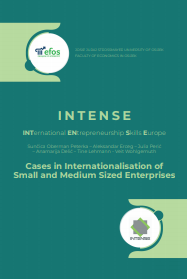
From big corporate career to small business ownership – this is how the story of Branka can be described. Branka had an outstanding career in the packaging industry in Croatia, but something just did not feel completely right. Branka, graduated from the Faculty of Economics and Business at the University of Osijek, and soon after was employed in the packaging industry. As a trainee, she gained her first work experience at Litokarton d.d., but Branka progressed remarkably fast and showed excellent results, getting promoted to finance director when she was only 27 years old. After Litokarton d.d., she continued her career in a private company, Ekovreća d.o.o., where she also showed her talent. In 2012, she found a job in the Žito Group and became the director of one company within the group. However, idea about her own business was growing stronger and stronger. After a year, she decided that it was time for new business ventures.
More...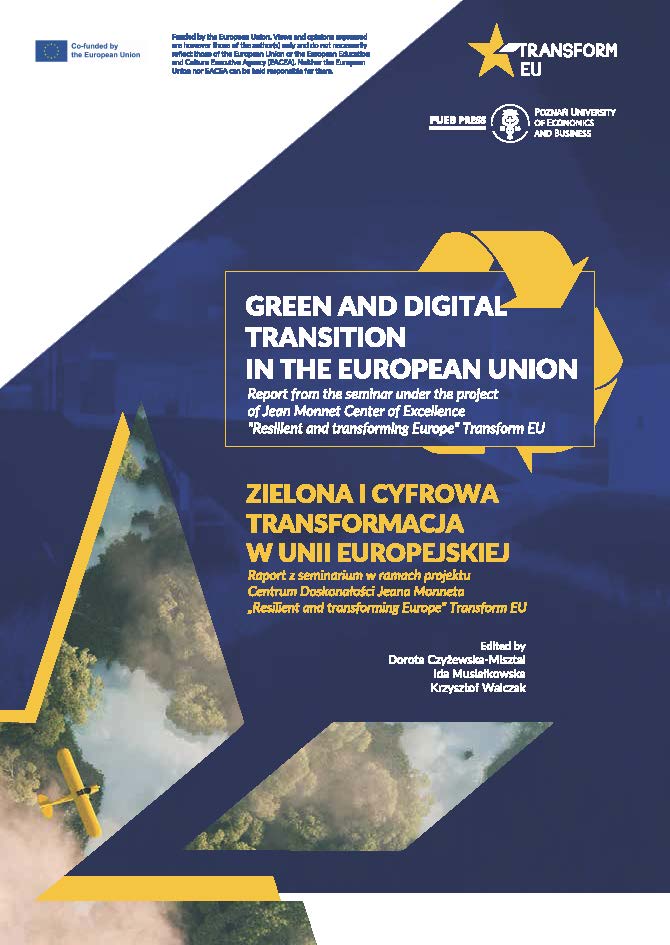
In the European Union, green and digital transition are being addressed through ambitious policy frameworks such as the European Green Deal and the Digital Europe Programme. Globally, efforts are coordinated through international agreements like the Paris Agreement and various UN initiatives. Both transitions offer opportunities for economic growth, improved quality of life, and enhanced sustainability. However, they also require significant investment, policy coordination, and societal adaptation to navigate successfully. In the light of the aforementioned challenges we provide four views on the problems and prospective solutions. The experts shared their knowledge during the webinar “Green and digital transition in the EU” organised under the project of Jean Monnet Centre of Excellence project “Resilient and transforming Europe” (Transform EU) on January 17, 2024 at the Poznań University of Economics and Business in Poznan. W Unii Europejskiej zielona i cyfrowa transformacja są przeprowadzane z wykorzystaniem ambitnych programów politycznych, takich jak Europejski Zielony Ład i Cyfrowa Europa. W skali globalnej wysiłki są koordynowane w ramach umów międzynarodowych, takich jak porozumienie paryskie i różne inicjatywy ONZ. Omawiane transformacje mogą przyczynić się do wzrostu gospodarczego, poprawy jakości życia i zrównoważonego rozwoju. Wymagają one jednak również znacznych inwestycji, koordynacji polityki i adaptacji społecznej, aby mogły być skutecznie przeprowadzone. W świetle tych wyzwań przedstawiamy cztery poglądy na temat problemów i potencjalnych rozwiązań. Eksperci podzielili się swoją wiedzą podczas webinarium „Green and digital transition in the EU” (Zielona i cyfrowa transformacja w UE) zorganizowanego w ramach projektu Centrum Doskonałości Jeana Monneta „Resilient and transforming Europe” (Transform EU) w dniu 17 stycznia 2024 r. na Uniwersytecie Ekonomicznym w Poznaniu.
More...